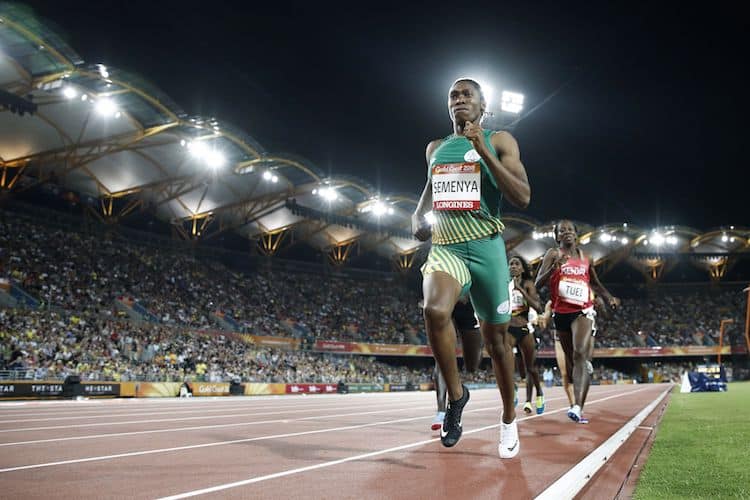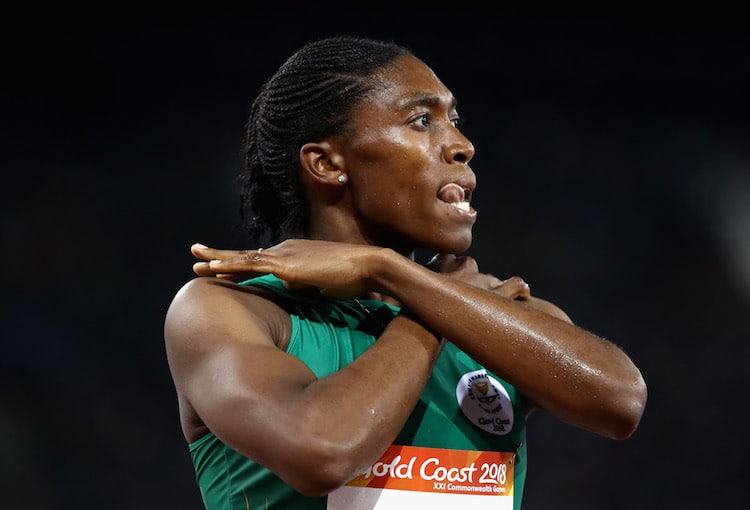Controversial new rulings on female testosterone levels threaten to derail the athletics superstar’s career, writes Gary Lemke in the latest SportsClub magazine.
There’s plenty of anger swelling in the chests of South African sports lovers. Some is in the belief that sons and daughters of Mzansi are being unfairly persecuted by forces from outside this country, while for others it’s the simmering internal racial tensions that continue to divide us.
Earlier this year Australia’s cricketing bullies came to the country and left with their tails between their legs. They had been silenced on and off the field, exposed as cheats for their ball-tampering antics, while Kagiso Rabada employed the services of advocate Dali Mpofu to get him off charges of shoulder-charging Australia captain Steve Smith.
Rugby fans, week in and week out, have bemoaned the ‘incompetence’ and ‘bias’ of New Zealand and Australian referees in the Super Rugby competition, using it to mask any cracks in their teams’ failures. Internally, we even had the likes of the minister of sport and the leader of the opposition weighing in on the SuperSport spat, live on TV, involving Ashwin Willemse, Nick Mallett and Naas Botha.
The minister and the DA leader were among the many people who dived into the debate without any iota of fact, declaring it a disagreement based on racial grounds. Suddenly, all that ubuntu and bonhomie were forgotten. But, when it comes to Caster Semenya, we all stand as one. And the defiant message is: hands off our golden girl!
Semenya was told to take testosterone-lowering treatment by athletics’ governing body, the IAAF. Technically, they didn’t tell the 25-year-old, but included her in a range of five events – the 400m, 800m, 1 500m, mile and 400m hurdles, all for women.
The inference was that those events are most likely to see females with elevated testosterone levels, or ‘intersex’, as they put it.
There are ‘explosive’ disciplines, like the 100 and 200m, the javelin, shot put and long jump, for instance, where power is key to success and where some female athletes look as though they have been training in the gym with Springboks Eben Etzebeth and Siya Kolisi.
But the scientists claim that it is in those five track events where the effect of raised testosterone is most pronounced and unfair.
But, it’s as if Semenya has been specifically targeted and, by giving her testosterone-reducing drugs, to give her opposition a chance. The reality is that, despite her dominance, Semenya’s 800m personal best 1min 55.17sec is nearly two seconds slower than the world record of 1:53.28. And her gold-medal winning time of 1:55.28 at the 2016 Rio Olympics would not have even beaten the slowest competitor in the men’s 800m final.
Last year, the women’s marathon world-record holder, Paula Radcliffe, said: ‘When we talk about it in terms of fully expecting no other result than Caster Semenya to win that 800m, it’s no longer sport.’ Yes, the South African has been superb, picking up the Olympic and world 800m titles and the Commonwealth Games 800 and 1 500m golds earlier this year, but the fact remains she hasn’t broken any world records in the process.
Which suggests that, as brilliant as she has been, there are no stars among her rivals to so much as push her to the line. So, it’s more the manner of how Semenya runs and wins, rather than her being unbeatable. It stands to reason that if anyone else ran close to a world record they’d beat Semenya.
With social media playing such a large role these days, it has let the trolls out and you don’t have to go too far to look for those who are scathing of Semenya and her intersex status. She is not alone. At the Commonwealth Games on Australia’s Gold Coast there were examples of other athletes – including those from ‘First World’ countries – who looked more masculine than what is the perception of a female.
The ruling on Semenya and others in the ‘five-event bracket’ comes into effect on 1 November. Sports scientist Ross Tucker has predicted that should the world champion have to reduce her natural testosterone, she ‘will run seven seconds slower over 800m’. Which means that she would finish closer to last than first. One can understand the anger – and it has united South Africans.
Pretoria professor Steve Cornelius resigned his position from the IAAF in protest at the new ‘rules’. ‘On deep moral grounds‚ I cannot see myself part of a system in which I may be called upon to apply regulations which I deem to be fundamentally flawed and most likely unlawful in various jurisdictions around the globe‚’ Cornelius wrote. ‘I cannot‚ with good conscience‚ continue to associate myself with an organisation which insists on ostracising specific individuals‚ all of them female‚ for no reason other than being what they are born to be.

‘The adoption of the new eligibility regulations for female classification is based on the same kind of ideology that has led to some of the worst injustices and atrocities in the history of our planet,’ he said in his resignation letter.
So, what next for Caster, given that the IAAF reckon they control and govern the sport and its rules, and if she doesn’t conform she is ineligible to run?
Clearly, another visit to the Court of Arbitration, which she appealed to after a similar ban over elevated testosterone levels after her 2009 World Championship gold, is in order. Popular opinion is that she’d win her case based on human rights.
Let’s also not forget the ridicule Semenya has endured. Once, on a road trip, she stopped at a garage and went into the female toilets, where she was chased out by a male attendant, who ordered her to go to the male toilets. And, after winning the 2009 World Championship gold, a popular weekly magazine put her on the cover wearing a dress and high heels.
Semenya is comfortable in jeans and takkies. She’s also comfortable in her belief in God, her own body, in the company of her wife and out on the track, training or competing. All of which help make her the national treasure that she is. Hands off, indeed.
![]()
Photo: Cameron Spencer/Getty Images




